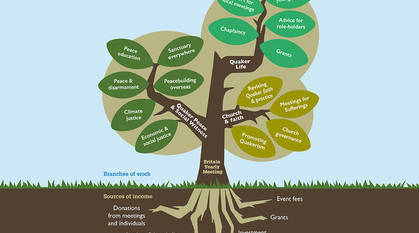10 things the government could do to rethink security
With new Secretaries of Defence and International Development, Marigold Bentley shares 10 things they could do to champion an alternative vision of security.

One of the good things about a new person taking over a job is that they can take a fresh look at the tasks in hand and ask: what's working? What's not? What might be out of date?
It can be an opportunity for a rethink.
As Quakers we care about building a peaceful and sustainable world. Security is not simply about military strategy and weapons; it is about what kind of human relations – local, national and global – we need to develop.
For Quakers in Britain, a vision of non-military security is a religious commitment and we join with others to support and enhance this work. The current political turmoil in the UK creates a rare opportunity to reset approaches to shared global challenges.
It's what led us, as part of the Rethinking Security group, to reach out to Penny Mordaunt and Rory Stewart, the newly appointed Secretaries of State for Defence and International Development, to share ten ideas of how peace and security could be prioritised in their respective government departments. This is what we have suggested to them.
1. Develop a conflict-sensitive analysis of new trading relationships
As the UK prepares to renegotiate trading and other relationships with individual states and multilateral institutions, we would like to see a cross-government approach that assesses how these interactions might contribute to either exacerbating global insecurity and violence, or building peace and respect for human rights. The Department for International Development (DFID) and the Ministry of Defence (MOD), as well as the Foreign & Commonwealth Office (FCO), have important expertise to contribute to these decisions.
2. Prioritise prevention in tackling climate breakdown, inequality and marginalisation
Many of the world's most serious challenges – inequality, climate change, marginalisation – require intensive international cooperation as well as action at home. Government departments could give these challenges greater strategic priority and investment, and be monitored and evaluated accordingly, including for the effectiveness of their collaboration with international partners.
3. Champion and implement international treaty obligations and policy frameworks
The UK could demonstrate its renewed commitment to global norms and multilateral action through implementation of international treaties. This would include sustained political and financial support for the UN 'Sustaining Peace' agenda; the peaceful, just and inclusive societies elements of the 2030 Agenda for Sustainable Development (SDG16+); the newly-established Youth, Peace and Security agenda; successive resolutions to UNSCR 1325 (2000) on Women, Peace and Security; and the Arms Trade Treaty.
4. Enhance aid and development spending
The UK is one of few countries in the world to meet the UN target of spending 0.7% of its gross national income on overseas development assistance.
To maximise the potential of its 0.7% commitment, DFID could increase efforts to ensure its programming contributes to the achievement of SDG16+, supporting local civil society groups working for peace, justice, equality and development. An effective focus on achieving SDG16+ commitments will be essential to tackling the structural conditions that lock the world's poorest people into poverty and inequality.
5. Increase diplomacy for peace
The government should prioritise and advocate for political and economic strategies to address persisting violent conflict. It could harness and build the UK's diplomatic capacity for peace, by increasing political and financial support for peace processes and mediation, investing in local capacities for peacebuilding in conflict contexts, and further developing of knowledge and skills in this area within the FCO and DFID.
6. Champion long-term planning in UN peace operations
The one-year and six-month mandates for UN peace operations makes it difficult to embed a culture that moves beyond directly protecting civilians to supporting long-term peacebuilding goals. As a permanent member of the UN Security Council, the UK can push for change at the highest level.
Future UK contributions to UN Peace Operations must promote the 'primacy of politics' as the basis for such interventions, as recommended by the UN High Level Panel on Peace Operations (HIPPO). They must also prioritise civilian protection as well as developing greater civilian capacity to address causes of conflict.
7. Re-set arms export policy
With the UK potentially operating outside the EU Common Position in the event of Brexit, the government should reaffirm its commitment to the Arms Trade Treaty. It could demonstrate this in practice by introducing a presumption of denial when considering applications for licences for the export of military equipment to repressive governments, states where there are credible allegations of human rights violations or areas of violent conflict. DFID in particular can play an important role in advising on arms export licences.
8. Reject the securitisation of aid
DFID should separate its international development efforts from the failed global war on terror by divesting from 'countering/preventing violent extremism' approaches and avoiding using aid in the service of security objectives such as counterterrorism. Instead, it could refocus its investment on peacebuilding, human rights and development.
9. Combat global militarisation
Using its influence in NATO, the government could work to harmonise military spending with the European context and release policymakers from the arbitrary target of 2% of GDP. It should resist pressure for further increases to the MOD's budget, and commission an inquiry into the feasibility of rebalancing military forces away from a focus on expeditionary capabilities and towards territorial and cyber defence.
10. Review nuclear weapons policy
The government should advocate and facilitate multilateral nuclear disarmament initiatives in close collaboration with other states, to promote further progress in establishing the mechanisms that make up the disarmament and non-proliferation regime. As part of a robust strategy for urgent multilateral disarmament, the UK should reassess its programme to renew the Trident system and its relationship with the Treaty for the Prohibition of Nuclear Weapons.
Many of these proposals would represent a course alteration to current government policy. Yet over half of UK adults oppose the use of UK troops in other countries and almost two thirds consider the sale of arms to Saudi Arabia unacceptable.
For this, and any future government, they remain key to rethinking how we understand security.


